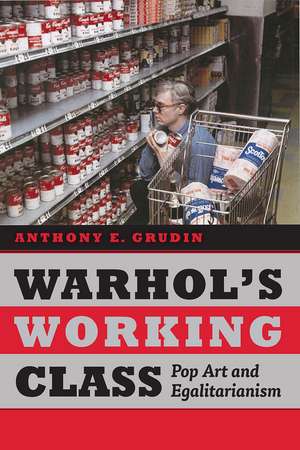Warhol's Working Class: Pop Art and Egalitarianism
Autor Anthony E. Grudinen Limba Engleză Hardback – 20 oct 2017
This book explores Andy Warhol’s creative engagement with social class. During the 1960s, as neoliberalism perpetuated the idea that fixed classes were a mirage and status an individual achievement, Warhol’s work appropriated images, techniques, and technologies that have long been described as generically “American” or “middle class.” Drawing on archival and theoretical research into Warhol’s contemporary cultural milieu, Grudin demonstrates that these features of Warhol’s work were in fact closely associated with the American working class. The emergent technologies Warhol conspicuously employed to make his work—home projectors, tape recorders, film and still cameras—were advertised directly to the working class as new opportunities for cultural participation. What’s more, some of Warhol’s most iconic subjects—Campbell’s soup, Brillo pads, Coca-Cola—were similarly targeted, since working-class Americans, under threat from a variety of directions, were thought to desire the security and confidence offered by national brands.
Having propelled himself from an impoverished childhood in Pittsburgh to the heights of Madison Avenue, Warhol knew both sides of this equation: the intense appeal that popular culture held for working-class audiences and the ways in which the advertising industry hoped to harness this appeal in the face of growing middle-class skepticism regarding manipulative marketing. Warhol was fascinated by these promises of egalitarian individualism and mobility, which could be profound and deceptive, generative and paralyzing, charged with strange forms of desire. By tracing its intersections with various forms of popular culture, including film, music, and television, Grudin shows us how Warhol’s work disseminated these promises, while also providing a record of their intricate tensions and transformations.
Having propelled himself from an impoverished childhood in Pittsburgh to the heights of Madison Avenue, Warhol knew both sides of this equation: the intense appeal that popular culture held for working-class audiences and the ways in which the advertising industry hoped to harness this appeal in the face of growing middle-class skepticism regarding manipulative marketing. Warhol was fascinated by these promises of egalitarian individualism and mobility, which could be profound and deceptive, generative and paralyzing, charged with strange forms of desire. By tracing its intersections with various forms of popular culture, including film, music, and television, Grudin shows us how Warhol’s work disseminated these promises, while also providing a record of their intricate tensions and transformations.
Preț: 243.18 lei
Preț vechi: 296.76 lei
-18% Nou
Puncte Express: 365
Preț estimativ în valută:
46.53€ • 48.68$ • 38.65£
46.53€ • 48.68$ • 38.65£
Carte indisponibilă temporar
Doresc să fiu notificat când acest titlu va fi disponibil:
Se trimite...
Preluare comenzi: 021 569.72.76
Specificații
ISBN-13: 9780226347776
ISBN-10: 022634777X
Pagini: 202
Ilustrații: 20 color plates, 51 halftones
Dimensiuni: 178 x 254 x 23 mm
Greutate: 0.74 kg
Ediția:1
Editura: University of Chicago Press
Colecția University of Chicago Press
ISBN-10: 022634777X
Pagini: 202
Ilustrații: 20 color plates, 51 halftones
Dimensiuni: 178 x 254 x 23 mm
Greutate: 0.74 kg
Ediția:1
Editura: University of Chicago Press
Colecția University of Chicago Press
Notă biografică
Anthony E. Grudin is associate professor of art history at the University of Vermont.
Cuprins
Acknowledgments
Introduction: Warhol and Class
1 Varieties of Pop
2 Warhol’s Participatory Culture
3 Warhol’s Brand Images
4 Warhol, Modernism, Egalitarianism
Conclusion: Warhol’s Neoliberalism
Notes
Index
Recenzii
“Andy Warhol is one of very few widely celebrated artists with a working-class background. . . .Grudin builds on this fact, theorizing on Warhol in terms of social class. Surprisingly, given the volume of scholarship on Warhol, this is the first major treatment of the artist using class as a framework, and the book is thus groundbreaking. The author treats the subject thoughtfully, avoiding essentialism and embracing the concept of "intersectionality." He points out that in Warhol's art, the fact that he depicted ordinary aspects of life that all classes had access to—especially grocery products—is key. . . .Recommended."
"Grudin’s arguments about class mobility, the complexities of Warhol’s first pop paintings and his use of comics and TV recontextualise some familiar images and lesser-known films. . . .With its emphasis on some of Warhol’s own issues with class, the book gives additional weight to his huge reputation."
“An outstanding work of scholarship that offers innovative perspectives on some of Warhol’s best-known output. . . . A tour-de-force piece of analysis. . . . Many of the arguments made in his book [are] sure to be taken up by future Warhol scholarship."
"Grudin's well-researched and nicely illustrated volume is a trenchant analysis of the class animus that Warhol's postmodern interpreters often leave hidden in plain sight."
“Warhol’s Working Class is a genuinely eye-opening, original contribution to the study of Warhol and Pop Art in general. Grudin artfully establishes the indispensable role class and materiality must play in our understanding of the artist. Anyone who thinks about Warhol—which is to say, pretty much everyone—is going to find this book compelling and revelatory.”
“Andy Warhol remains one of the most important artists of the twentieth century, and Anthony Grudin has brilliantly identified one more reason this is so. His cans and bottles, celebrities and disasters record the power and consequences of class performances, stylistics, and affects—especially those of the working class. What’s more, Warhol’s Working Class arrives at a critical moment when neoliberalism’s deceptive promises of individualism, brand-based mobility, and self-determination have come under new scrutiny. In clear and compelling prose, Grudin illuminates how Warhol, too, participates in this important conversation.”
